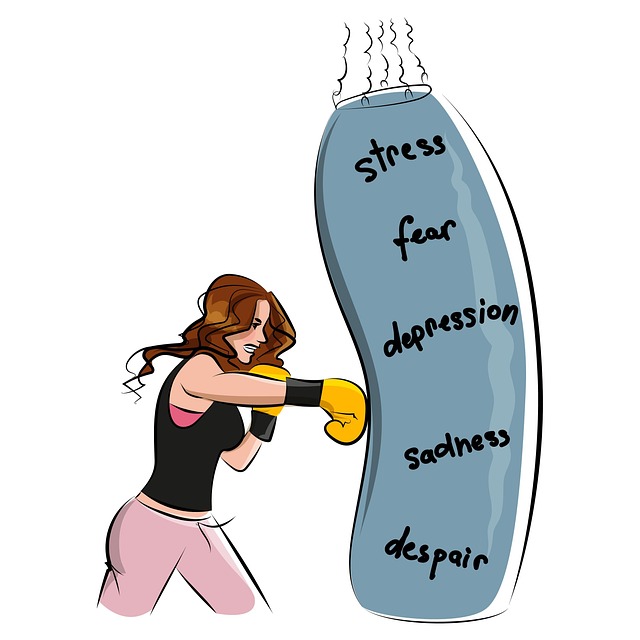Centennial Family Counseling Therapy focuses on building resilience as a core component of mental well-being. By combining Mind Over Matter principles with mind-body connections, they guide clients toward self-compassion and growth mindsets. Through tailored programs like Mental Wellness Coaching and Trauma Support, individuals and families learn effective coping strategies and trauma management, enhancing their ability to thrive despite adversity. The RFM (Resilience, Flexibility, Mastery) approach, including exercises like gratitude practices and goal setting, has proven successful in improving mental wellness, fostering confidence, and transforming family dynamics. Regular participation in RFM programs at Centennial Family Counseling Therapy promotes long-term emotional healing and positive changes in mental health.
“Discover the power of Resilience, Flexibility, and Mobility (RFM) exercises in fostering mental fortitude. This comprehensive guide explores how RFM, a revolutionary approach in counseling, equips individuals and families with essential tools to navigate challenges. From understanding the core principles to practical implementation strategies, we delve into its impact on well-being.
Learn from real-world examples, including successful case studies from Centennial Family Counseling Therapy, and uncover methods for long-term resilience building through continuous RFM practice.”
- Understanding RFM and its Role in Resilience Building
- The Impact of Resilience Exercises on Individuals and Families
- Implementing RFM in a Therapeutic Setting: A Step-by-Step Guide
- Case Studies: Successful RFM Integration in Centennial Family Counseling
- Enhancing Long-Term Well-being: Continuous RFM Practice and Follow-up
Understanding RFM and its Role in Resilience Building

At Centennial Family Counseling Therapy, we recognize that building resilience is a cornerstone of overall well-being. This concept, often centered around our ability to recover from adversity, is crucial in navigating life’s challenges. Resilient individuals are equipped with effective coping strategies and a strong sense of self, enabling them to adapt and flourish even in the face of difficult circumstances.
Our approach integrates the principles of Mind Over Matter, fostering a deep understanding of the mind-body connection and its impact on emotional resilience. Through innovative Mental Wellness Coaching Programs Development tailored to individual needs, we guide clients towards mastering coping mechanisms, cultivating self-compassion, and developing a growth mindset. By combining traditional therapy techniques with Trauma Support Services, we empower individuals and families to build lasting resilience, ultimately enhancing their ability to thrive in all aspects of life.
The Impact of Resilience Exercises on Individuals and Families

Resilience exercises have a profound impact on individuals and families, offering a transformative pathway to mental health and well-being. These activities, often tailored through Centennial Family Counseling Therapy sessions, equip people with coping mechanisms that can help navigate life’s challenges. By focusing on building resilience, individuals gain the ability to adapt to adversity, enhancing their overall mental fortitude. This is particularly beneficial for families as it fosters a supportive environment where everyone learns to cope with stress and trauma effectively.
The integration of these exercises into therapy sessions goes beyond individual growth; they contribute to a robust Risk Management Planning for Mental Health Professionals framework. Trauma Support Services and Stress Management Workshops Organization can leverage these practices to create a safe space for clients. Through regular participation, individuals and families develop a sense of empowerment, enabling them to face life’s uncertainties with newfound confidence. This resilience is not just about enduring hardship but also thriving in the aftermath, which is crucial for long-term mental health success.
Implementing RFM in a Therapeutic Setting: A Step-by-Step Guide

Implementing RFM (Resilience, Flexibility, and Mastery) in a therapeutic setting can be a game-changer for clients seeking to overcome challenges and enhance their mental well-being, particularly at establishments like Centennial Family Counseling Therapy. Here’s a practical guide to help therapists integrate this approach:
1. Educate and Establish Rapport: Begin by explaining RFM concepts, emphasizing their relevance in managing mental illness and reducing stigma. Build a safe space through active listening and open dialogue. This foundation fosters trust, crucial for clients’ willingness to engage in resilience-building exercises.
2. Assess Individual Needs: Understand each client’s unique journey and struggles. Identify areas where RFM can offer support—be it coping with stress, anxiety, or past traumas. Tailoring the approach ensures that exercises resonate with personal experiences, enhancing engagement and potential for positive outcomes.
3. Introduce Resilience-Building Techniques: Provide a range of RFM strategies: mindfulness practices for mood management, cognitive reframing to challenge negative thoughts, and problem-solving skills for effective decision-making. Explain how these tools empower individuals to navigate life’s challenges more flexibly.
4. Facilitate Group or Individual Exercises: Encourage clients to participate in group discussions, sharing experiences and coping strategies. Alternatively, individual exercises can foster personal reflection and mastery over one’s mental health. For instance, a daily gratitude practice or setting achievable goals can boost confidence and resilience.
5. Monitor Progress and Adjust: Regularly assess clients’ engagement and well-being. Tailor the RFM program based on their feedback and observed improvements. This adaptive approach ensures that the exercises remain relevant and effective throughout the therapy journey, contributing to sustained mental health benefits.
Case Studies: Successful RFM Integration in Centennial Family Counseling

At Centennial Family Counseling Therapy, the successful integration of RFM (Resilience, Flexibility, and Mastery) principles has been a game-changer for many clients. Through tailored exercises designed to build inner strength, counselors have witnessed profound improvements in their patients’ mental wellness. One notable example involves a family grappling with chronic stress, where the RFM approach empowered them to navigate challenges more effectively.
The therapy sessions incorporated Mental Wellness Journaling Exercise Guidance, encouraging the family to reflect on their experiences and identify resilience-building opportunities. Over time, this practice fostered a sense of confidence boosting within each member, enabling them to approach stressors with newfound composure. The transformation was remarkable, with improved communication and enhanced emotional regulation, showcasing the power of RFM in fostering a more robust and adaptable family dynamic.
Enhancing Long-Term Well-being: Continuous RFM Practice and Follow-up

Engaging in regular Resilience, Family, and Mental (RFM) exercises is a powerful way to enhance long-term well-being for individuals and families seeking support from Centennial Family Counseling Therapy. The continuous practice of RFM techniques fosters an environment where emotional healing processes can thrive. By integrating these activities into daily routines, participants learn effective crisis intervention guidance that empowers them to navigate life’s challenges with greater resilience.
Through consistent follow-up sessions, the benefits of RFM training extend beyond immediate solutions, encouraging long-lasting positive changes. This ongoing support facilitates the development of robust social skills training, enabling individuals and families to build a strong foundation for their mental health. The holistic approach of Centennial Family Counseling Therapy recognizes that resilience is cultivated over time through dedicated practice and nurturing environments.
The implementation of RFM (Resilience, Flexibility, and Mastery) exercises in therapeutic settings, as demonstrated by case studies in Centennial Family Counseling Therapy, has proven to be a powerful tool for enhancing individual and family resilience. By following a structured guide, therapists can effectively integrate these practices into their sessions, fostering long-term well-being. The continuous practice of RFM techniques post-therapy further strengthens clients’ ability to navigate challenges, showcasing the importance of building resilience as an ongoing process.














